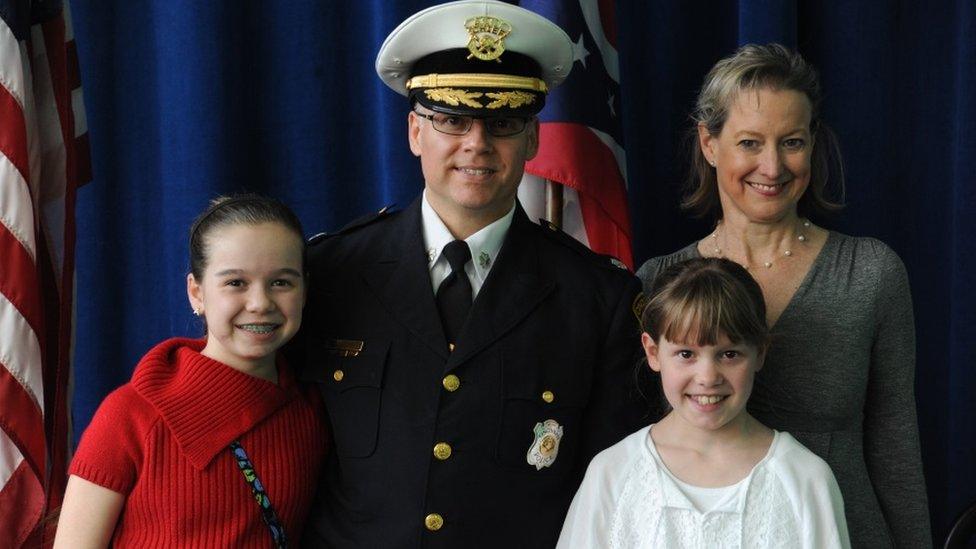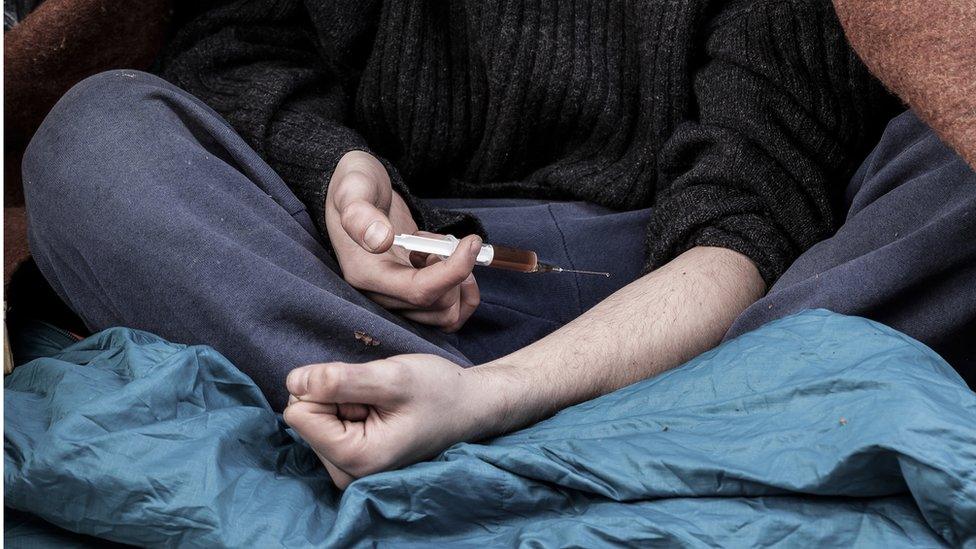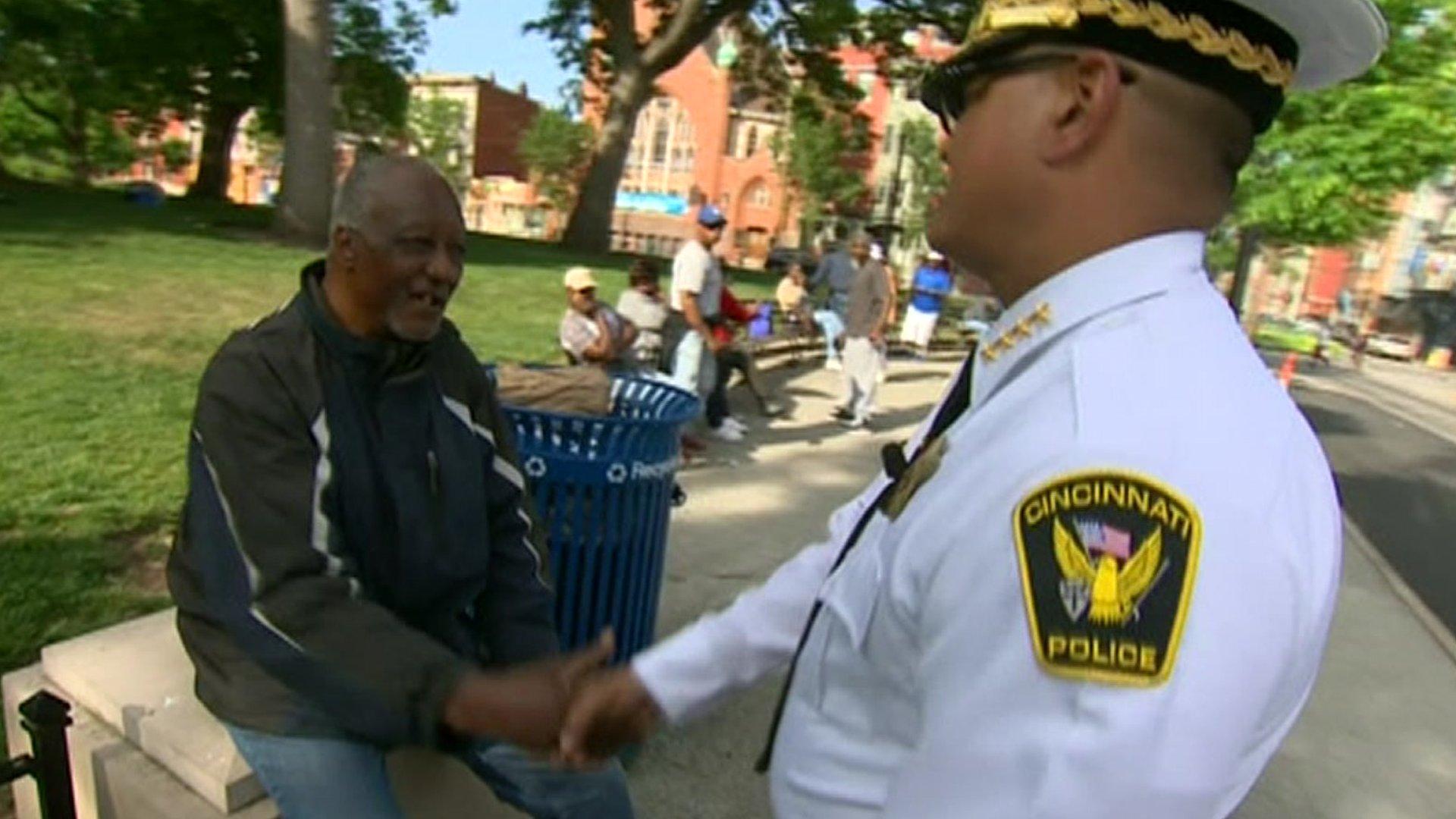Wales-born police chief tackles Cincinnati heroin crisis
- Published
Mike John said heroin is "one of the biggest challenges" facing Ohio
On the day Americans decide their future president, we take a look at the role a Welshman is playing in tackling a "public health crisis" in Ohio.
It is very much considered a swing state, where republican Donald Trump and democrat Hillary Clinton have similar levels of support.
But what is agreed is the growing problem of drug addiction in the city of Cincinnati.
Last year there were 414 deaths by overdose, up from 189 in 2011.
Lt Col Mike John is an assistant police chief with the Cincinnati Police Department, working as an investigations bureau commander.
He grew up the youngest of three children in Cardiff, where his father was a lecturer and his mother a primary school teacher.

Mr John tries to return to Wales every couple of years. He is pictured with wife Christine during a visit in May

Mr John pictured with his family on the day of his promotion to Assistant Police Chief
It was during his final year at Cardiff University that his path in life was set.
He met his future wife Christine, an exchange student from Cincinnati. He emigrated to the USA after graduation in July 1990 and they married a month later.
Mr John became a US citizen on the first day he was eligible in May 1994.
Three years later he joined the Cincinnati Police Department and has risen through the ranks.
"I truly love my job," said Mr John. "I am incredibly fortunate to work with some incredible professionals who care about their fellow citizens."
He said the department is now widely considered as "a model" in terms of policing in the United States.
'Poison'
Heroin addiction is considered a public health crisis in Cincinnati, but it is not a new drug to the city.
Authorities say the increasing number of overdoses is down to the drug being laced with more powerful substances such as Fentanyl and Carfentanil, which is used to tranquilise large animals, such as elephants.
"It's poison," said Mr John. "People simply do not know what they are buying.
"It is literally killing people - it is like pointing a gun to somebody when you put these synthetics on the street."
He added: "I don't think there's anybody that wants to be a heroin addict when they grow up.
"But it is so difficult because it makes you sick when you want to quit."
In terms of tackling the epidemic, police have learned it is not a problem they can "arrest their way out of," and so they have changed their traditional law enforcement approach.
"Simply incarcerating those found in possession of drugs does not necessarily provide those suffering from addiction the recovery services they need to rehabilitate," said Mr John.

All Cincinnati first responders are equipped with Naloxone as a means to revive overdose victims
The Hamilton County Heroin Coalition, external brings together law enforcement, public health officials, prevention experts and treatment providers.
It was set up to provide drug users with the emergency support they need and to prevent the spread of drug use in young people.
Under the coalition, a special unit of officers has been developed called The Hamilton County Heroin Task Force.
It is responsible for investigating all deaths attributed to heroin overdoses and aims to find out where the drug came from and who was responsible for providing it.
Prosecution protection
In addition to the coalition and task force, state law has been amended to protect drug users from prosecution when they seek medical help.
"This is a challenging time for all police professionals," said Mr John.
"Although we have improved police community relations here locally, we are by no means at a point where we could consider saying 'job done'."
BBC Wales presenter Garry Owen visited Ohio in the run up to the election to find out the issues which matter to the people there.
You can catch up with the special programme Y Ras i'r Ty Gwyn on BBC iPlayer.
- Published21 May 2015
